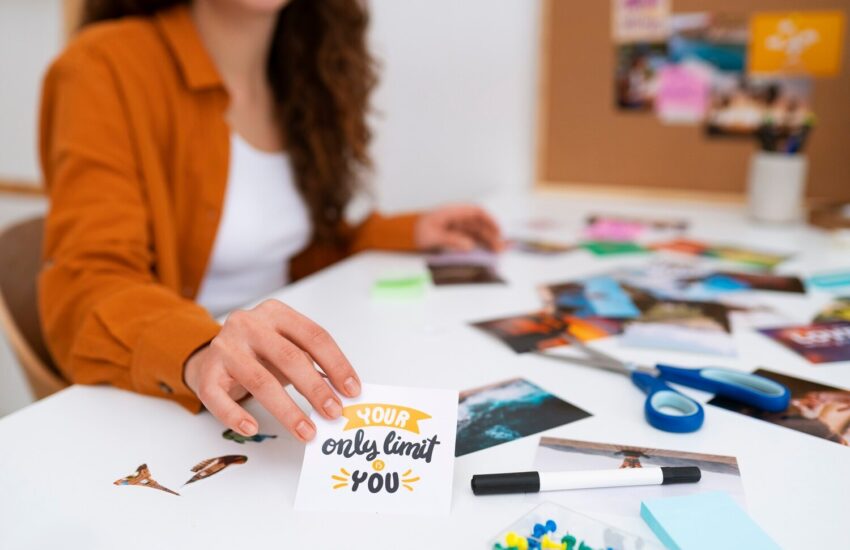Custom labels and stickers might seem like just a creative or marketing tool, but they’re becoming low-key mental health allies. Whether it’s a motivational sticker on your laptop or a custom label on your water bottle reminding you to hydrate, these small visual cues can have a surprisingly big effect on your mood, mindset, and mental wellness.
Visual Reminders Influence Behavior
The brain responds quickly to visuals. Studies in behavioral psychology have shown that visual cues can strongly influence decision-making and habits. That’s where custom stickers and labels come in.
Say you’ve got a water bottle with a custom label that says, “Refill your energy. Drink.” That’s more than just a cute sticker. It’s a behavioral nudge. It taps into the habit loop: cue, routine, reward. The label acts as the cue, hydration becomes the routine, and the benefit—more energy, better focus—is the reward.
It’s simple, but it works. You see the sticker every time you reach for your bottle, and over time, your brain associates that label with taking care of yourself.
Personalization = Ownership
Custom labels let you put your identity into the things you own. That sense of ownership boosts self-expression, which is tied to improved mental well-being.
Let’s say you create a custom sticker for your journal that says, “This is my safe space.” Or a label for your laptop that reads, “Creative mode: ON.” These personal touches help reinforce your identity, goals, or affirmations in a tangible way.
The more connected you feel to your personal belongings, the more likely you are to use them intentionally. And that matters. Something as small as using a planner you customized with motivational stickers can help keep you grounded, organized, and less stressed.
Affirmations in Action
Affirmations aren’t just cheesy phrases on Pinterest. When done right, they can shift your mindset over time. Repeating positive statements helps rewire negative thought patterns—a concept backed by cognitive behavioral therapy (CBT).
Now take that idea and put it on a sticker. A label on your mirror that says, “You’ve survived 100% of your worst days,” or a sticker on your water bottle that reads, “You are enough,” becomes a passive yet powerful way to integrate affirmations into your day.
Unlike sticky notes that fall off or reminders that get buried in apps, custom stickers last. They stay visible and become part of your environment. That consistent exposure is what makes the affirmation stick—literally and psychologically.
Creative Control = Stress Relief
Designing your own labels and stickers can also be therapeutic. There’s a reason adult coloring books took off as a self-care trend—it’s about focus and flow. The same applies to creating sticker designs.
You don’t need to be an artist. Platforms like Canva or sticker-making apps let you easily make personalized designs with quotes, colors, and icons that match your mood or goals. That creative process in itself is calming. It provides a sense of control, which is important when life feels chaotic.
For people with anxiety or depression, even small acts of creation—like designing a sticker that says “Breathe” and putting it where you’ll see it often—can offer comfort and stability.
Encouraging Healthy Habits
Stickers can be subtle accountability tools too. For example, a custom label on your water bottle that includes time markers (like 8 AM, 10 AM, 12 PM, etc.) can turn drinking water into a game or challenge. Not only does it promote hydration—which directly affects mood and cognitive function—but it also adds structure to your day.
Similarly, you can use labels for meal prep containers, vitamin boxes, or even mirrors. A sticker on your mirror that says, “Have you moved today?” isn’t judgmental—it’s a check-in. A label on your snack jar that reads, “Fuel, not filler” reframes your approach to food.
You’re not guilt-tripping yourself. You’re giving yourself cues and encouragement, which is a more sustainable form of motivation.
Reducing Digital Dependence
In a world full of screens, physical reminders carry more weight. Phone reminders get swiped away. Notifications get lost in the noise. But stickers—especially well-placed ones—cut through that.
Instead of relying on your phone to remind you to take a break or breathe deeply, a label on your desk or monitor can do that without adding to screen time. And reducing digital overload—even in small ways—helps protect mental clarity.
It’s a tiny analog rebellion that can actually lead to a clearer head.
Community and Connection
There’s also a social side to custom stickers. Sharing sticker packs or label ideas with friends creates a sense of connection. Whether it’s a group of coworkers using matching water bottle labels to boost morale, or friends swapping affirmation stickers in care packages, these small items can carry emotional weight.
In therapeutic environments, stickers are often used in journaling or group activities because they’re low-pressure, expressive, and accessible. They invite creativity without demanding vulnerability. That’s powerful in a group setting.
Final Thoughts: It’s the Little Things
Custom labels and stickers aren’t a replacement for therapy, medication, or deep inner work. But they are a useful tool in the broader mental health toolbox. They’re visual, personal, and practical. They support habit-building, self-expression, and mood regulation. And in a time when the world feels noisy and overwhelming, even small reminders—like a sticker on your water bottle telling you to take care of yourself—can make a meaningful difference.
